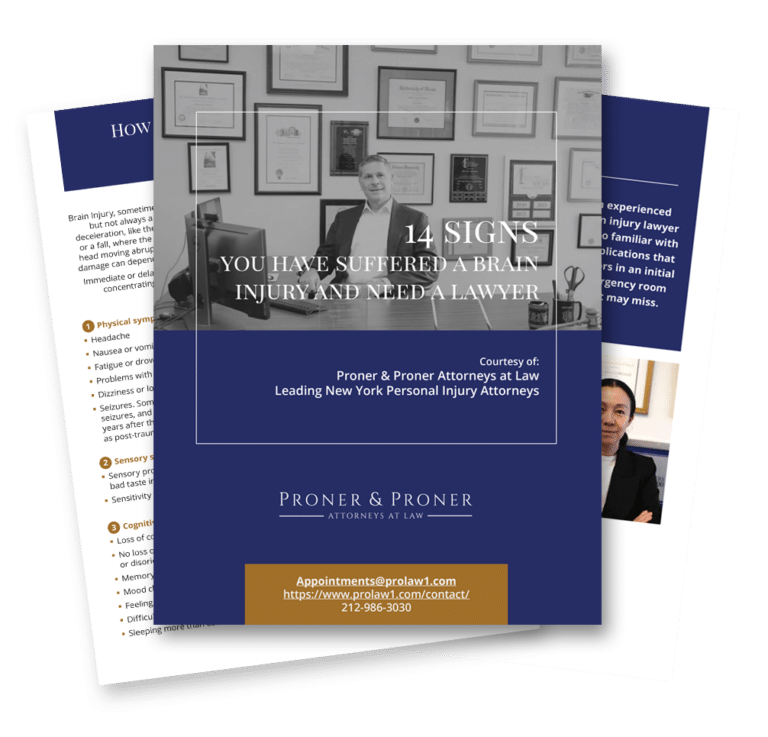Home » New York City Personal Injury Lawyer » New York City Brain Injury Lawyer
 Quicklinks
Quicklinks
NYC Personal Injury Attorneys Help Accident Victims Get Compensated For Brain & Spinal Cord Injuries In New York
The brain and spinal cord both control some of the most important operations of the human body. For this reason, an injury to either of these areas can be devastating to a victim’s overall health and well-being. When a car or motorcycle accident results in a traumatic brain injury (TBI) or a construction accident leaves the victim paralyzed, it is important to obtain all of the evidence surrounding the claim in order to secure the maximum settlement for your injuries. An experienced New York City personal injury lawyer can help achieve these goals.
Contact An NYC Accident Attorney Who Understands Complex And Devastating Injuries.
Proner & Proner attorneys have experience in working with experts to establish all the damages that may from a brain injury or a spinal cord injury. The different experts that we work with include neurologists, neurosurgeons, neuropsychologists, psychiatrists, vocational rehabilitation experts, psychologists, engineers, and life care planners amongst others.
With brain injury, often times the brain injury is not initially diagnosed at a hospital or may be diagnosed at the hospital but adequate follow-up care is not rendered. With skilled lawyers working with experienced medical practitioners, we can ensure that all damages are documented and that the proper care is delivered to the patient. Further, we ensure that all damages are supported by the medical records which are admissible as evidence. This evidence can be used to support larger awards from a jury and larger settlement offers from insurance adjusters for brain injury patients.
Brain And Spinal Cord Injury Cases Handled By NYC Law Firm Proner & Proner
Proner & Proner assists clients with brain and spinal cord injuries and helps them obtain the compensation they need and deserve. Our New York City lawyers have won multi-million dollar verdicts and settlements in cases involving:
- Traumatic brain injury (TBI)
- Concussion
- Contusion
- Coup-Contrecoup injury
- Diffuse axonal injury
- Paraplegia
- Quadriplegia
If you sustained a brain injury from an accident that was not your fault, getting fair compensation is a fundamental right. The attorneys of Proner & Proner will work tirelessly to ensure that you get fair compensation for your brain injury. We’ll help you to document all the damages you sustained in your brain injury from an accent that was not your fault. Additionally, depending on the law in the state where your case is being heard, you may be entitled to compensation even if the accident was partially your fault. Only by speaking to experience brain injury attorney will you be able to determine all your rights.
For spinal cord injuries, sometimes the result is paralysis or partial paralysis. The degree of disability varies and depends on the severity and placement of the injury. With spinal cord injuries, victims usually experience partial or total paralysis in one or more limbs, causing motor difficulties, loss of sensation and in some cases problems with bowel and bladder control are persistent. Brain injuries can cause significant problems with memory, speech, thinking, personality and behavioral changes, loss of decision-making ability, uncontrolled anger, and depression. In short, the consequences of either type of injury can be profound.
The extent of injury can affect all of the ongoing daily activities for the spine injury patient. Proner & Proner can work to get all damages documented to get you to help you need, whether it is a special car, modifications to your home with ramps, and other wheelchair accessible modalities. We will also include the cost of future care in your life care plan to present to a jury or to an insurance company adjustor to get you the maximum award for your spinal injury. If you are suffering from a spinal injury that was obtained an accident that was not your fault you need an expert spinal injury attorney to determine your full rights.
Related Pages
New York Office
122 E. 42nd St #2015, New York, NY 10168
Email: info@prolaw1.com
Phone: (212) 986-3030
Successful Cases
$6,900,000.00
Female, Male: Premises Liability
$3,500,000.00
Female, 43: Premises Liability
$3,500,000.00
Female, 33: Serious Personal Injury
Testimonials
Got into a motorcycle accident and went to Proner&Proner. I received great services and excellent results, I would definitively recommend the services. It was a great experience for me, A++ attorneys.
– GOOGLE REVIEWER / CLIENT
When I felt I needed legal support after a motorcycle accident, I sought out an attorney who was a motorcyclist as well. Fortunately, I found Mr. Proner. The concern I received was a comfort. The firm’s contact with me while working on my behalf was reassuring and the results certainly made a bad experience easier to put behind me. My gratitude to Proner & Proner.
– GOOGLE REVIEWER / CLIENT
Mitchell Proner is an amazing and very experienced trial lawyer, who takes care of his clients. He represented me in a car accident case, kept me very informed during the lengthy legal process and got me the settlement that I expected. His friendly office staff was always willing to assist and answer any questions I had. I recommend Mitchell Proner to all my friends and family!
– GOOGLE REVIEWER / CLIENT
I am very grateful for the services they were very quick and they dealt with my case right away. Thank you very much.
– GOOGLE REVIEWER / CLIENT
Mitchell Proner is an excellent lawyer. He took our case and did the right thing. We recommend him 100% to anyone. His staff are professionals and they care about their clients.
– GOOGLE REVIEWER / CLIENT
Greatest Lawyers I ever had. Answer any and every question I ever had. They treated me as one of the family. I can’t say enough about this firm. Thank you so much for all you guys did.
– GOOGLE REVIEWER / CLIENT
Awesome experience, excellent service, very professional and fast resolving my case. My number one attorney – definitely recommended more than once. Thank you!
– GOOGLE REVIEWER / CLIENT
Want to Know if You Have a Brain Injury and Need a Lawyer?
Check out our newest resource on the 14 signs you have suffered a brain injury and need a lawyer

All You Have To Do Is Call 212-500-1003 To Receive Your Free Case Evaluation.
Call An Experienced Brooklyn Brain & Spinal Cord Injury Lawyer For A Free Consultation
If you or a loved one suffered a brain or spinal cord injury in a motorcycle accident, a serious fall, a work-related accident or an auto crash, you owe it to yourself to learn about your legal options. Find out how Proner & Proner in New York City can help you obtain the maximum compensation for your spinal cord or brain injury. Call today for a free initial consultation or contact the firm online.
Attorney Mitchell Proner serves clients across New York and Connecticut and also handles cases throughout the United States.

Get Answers To Frequently Asked Questions About Brain Injury Claims In NYC
Do you still have questions about how to pursue a personal injury claim after suffering a brain or spinal cord injury in New York? Continue reading here:
Your consultation with an attorney at Proner & Proner is free. We don’t get paid unless we get money for our clients. We will pay expenses and get a percentage of the recovery at the end, consistent with local bar association rules.
While an x-ray typically will show a fractured skull, a CAT scan is the standard test to assess the brain right after injury for evidence of trauma. Often, initial testing does not show any damage. Depending on the circumstances of the accident, the patient may suffer from permanent brain injury. Cognitive testing done by a neurologist and neuropsychologist may reveal decreased memory function, decreased executive skills, or other functional impairments.
At Proner & Proner, we maintain that an accident victim is entitled to financial compensation for all brain injuries — from catastrophic to mild traumatic brain injury — to the extent that the claimant is not at fault for their accident. We can put together a team of trained physicians to assess and diagnose all brain injury and subsequent impairment. These talented practitioners can present these injuries for insurance carriers to offer fair settlement. We will also be prepared to show evidence of the impairment to a jury if the case is to go to trial. We are very experienced in handling closed head injury cases.
Typically there are several issues that go toward the value of a case. The first issue is determining fault for the accident. Even though you may be partially at fault for the accident, you could still be entitled to compensation.
A second issue is the extent of initial damage and the permanency of your injuries. The degree of permanency of symptoms that cause suffering, anguish, depression, mood swings, sleep loss, or other impairments, along with any loss of earnings or work capacity, will affect the value of the case.
Additionally, if someone loses the ability to pursue a hobby or skill, such as a head injury limiting someone’s ability to play guitar, the value of the case could also be affected.
Lastly, sometimes recovery is limited by the amount of insurance or assets which the individual or company that caused the injury has readily available to pay damages. The financial background of the party we are claiming form and how much insurance they purchased may affect the ultimate value of the personal injury claim.
In The Press



Office Location
Even though the firm has successfully represented clients from five continents and over 30 jurisdictions, Proner & Proner serves New York personal injury clients in all five boroughs from our office in Midtown Manhattan.


